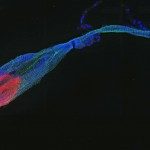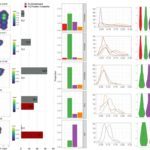Link to Pubmed [PMID] – 30837655
Link to HAL – pasteur-02059896
Link to DOI – 10.1038/s41598-019-40407-x
Scientific Reports, 2019, 9 (1), pp.3615. ⟨10.1038/s41598-019-40407-x⟩
Vector-borne diseases and especially malaria are responsible for more than half million deaths annually. The increase of insecticide resistance in wild populations of Anopheles malaria vectors emphasises the need for novel vector control strategies as well as for identifying novel vector targets. Venus kinase receptors (VKRs) constitute a Receptor Tyrosine Kinase (RTK) family only found in invertebrates. In this study we functionally characterized Anopheles VKR in the Gambiae complex member, Anopheles coluzzii. Results showed that Anopheles VKR can be activated by L-amino acids, with L-arginine as the most potent agonist. VKR was not required for the fecundity of A. coluzzii, in contrast to reports from other insects, but VKR function is required in both Anopheles males and females for development of larval progeny. Anopheles VKR function is also required for protection against infection by Plasmodium parasites, thus identifying a novel linkage between reproduction and immunity in Anopheles. The insect specificity of VKRs as well as the essential function for reproduction and immunity suggest that Anopheles VKR could be a potentially druggable target for novel vector control strategies.










